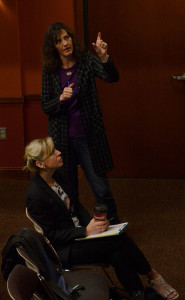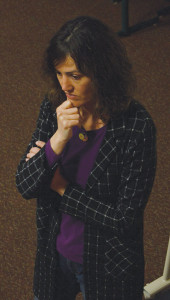Sheryl Cunningham, associate professor of communication, posed the question “Where are the women?” during her presentation on March 29.
 In contemporary politics, issues such as birth control, abortion, Planned Parenthood and women’s rights in general have been controversial topics between parties. Focusing on the 2012 general election, Cunningham found that in print media, over 50 percent of people quoted talking about these issues were men.
In contemporary politics, issues such as birth control, abortion, Planned Parenthood and women’s rights in general have been controversial topics between parties. Focusing on the 2012 general election, Cunningham found that in print media, over 50 percent of people quoted talking about these issues were men.
“We do not have even close to proportional representation of men and women in politics,” Cunningham said. “And this matters.”
When journalists go to receive quotes from governmental leaders, they have more sources available that are men rather than women. The structural imbalance gives journalists less of an opportunity to quote women, which, according to Cunningham, is a problem when it comes to talking about women’s issues.
Cunningham gave examples of speech from Todd Akin and Rick Berg, who shared their opinions on whether women should continue pregnancy after being raped or if they should be able to abort the baby.
In both cases, the male politicians either abstained from talking about the woman all together or reframed the question to address other responsible parties, erasing women from the issue.
She said that this erasure, either through absence or through reframing, was what she was interested in studying in political rhetoric.
Cunningham emphasized that while the viewpoints of these politicians could be valid, they cannot continue to forget women in these situations.
For example, politicians may address the religious institutions’ belief systems, but avoid talking about how the situation would affect the woman. Even though their argument may be valid, they  are still missing the key to the equation: the woman.
are still missing the key to the equation: the woman.
After listening to Cunningham’s words, Elizabeth Arentz, ‘16, said that she did not fully realize the extent of how much erasure actually occurs in women’s rights conversations.
“Cunningham’s lecture made me consider how the lack of female representation in politics often goes unnoticed, yet leaves lasting implications for how women live their lives,” Arentz said. “The overall erasure of women is unsettling.”
Cunningham’s presentation ended discussing the Affordable Care Act and how some religiously-affiliated organizations would like to prohibit access to birth control for their female employees. Is this acceptable? Should religious institutions have the ability to determine a woman’s access to various elements of healthcare?
Kevin DeGulis, ‘17, said that even as a male, this is concerning, as he understands how important healthcare is for everyone searching for a job.
“Healthcare, going into my future: that’s one of the number one things I’m looking at for my job,” DeGulis said.
Cunningham left the audience with a quote from Judith Butler, a gender theorist, about how the decision of a woman does not truly belong to her in today’s society.
“The boundary of who I am is the boundary of the body,” Butler said. “But the boundary of the body never fully belongs to me.”







